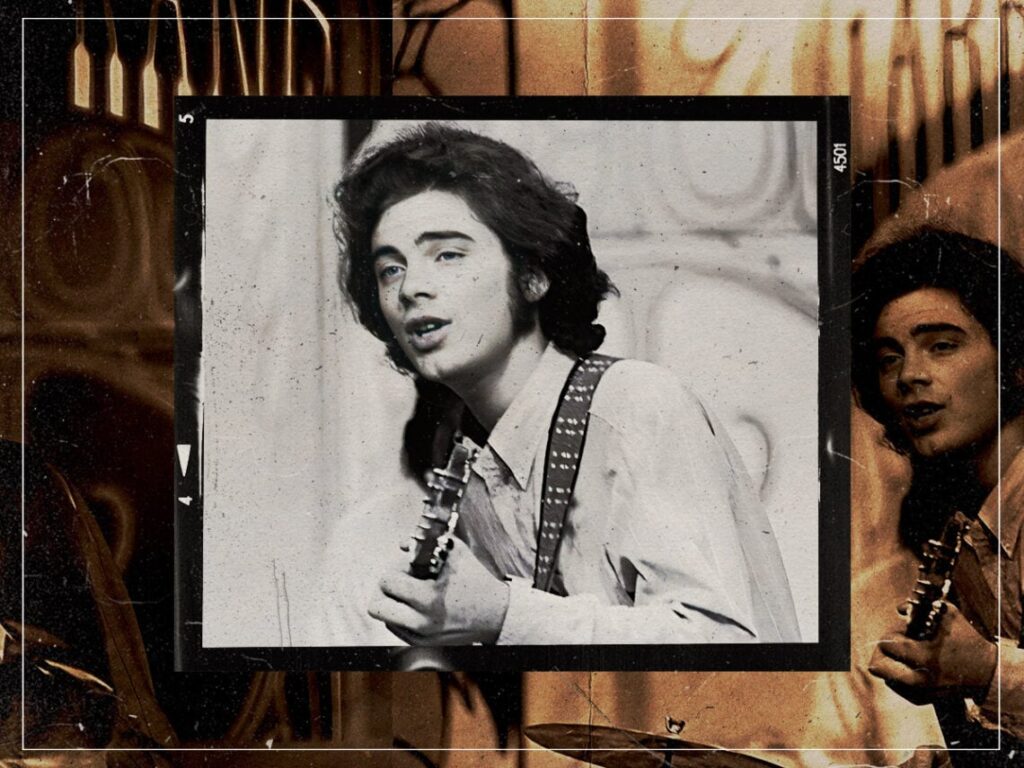‘All That May Do My Rhyme’: the unexpected redemption album by Roky Erickson
 Posted On
Posted On
(Credits: Far Out / TIDAL)
Problem-solving seems an abstract concept when you have a mind like Roky Erickson’s. Even worse is the idea that problem-solving ceases to exist when you’re unaware of its existence, and all that’s left is a black hole of thoughts and ideas that seem to be anything but imaginable, the ghosts of past, present, and future wrapping together in one amalgamation of music presentation.
Erickson was a genius; anyone can attest to that. But he also embarked on an incredibly complicated relationship with mental health conditions throughout most of his life. As external support fought and judged Erickson’s cognitive capacity for normalcy, the genius himself got to work creating thought-provoking soundscapes and lyrical narrative whirlwinds as beautiful as they were convoluted.
Erickson was consistently on the verge of artistic greatness and mental implosion, both seeming to intertwine at pivotal moments and resulting in creative explorations that no one will ever, or could ever, replicate ever again. His own mind haunted him, but these ghostly enigmas manifested in his work, culminating in some of the most transcendental psychedelia the world has ever known.
As Erickson’s inability to hover over his work grew more and more prominent, so did his mental decline, and soon, he wasn’t a part of it at all. Soon, he was a shadow, even if the shadow felt less of a contradiction to what he knew to be real; these were two imperatives he could not extract from one another, and the accomplice he found in music soon dissolved into nothing.
Erickson had been away from any spotlight by the time he released All That May Do My Rhyme, a title that is harder to analyse than it is to speak. This difficulty arises not from its complexity—musically, it isn’t very intricate—but from its lack of depth compared to his previous releases. As a result, it doesn’t provide as much insight into Erickson’s mind as his earlier work did.
Erickson’s institutionalisation in the 1970s conditioned him into a man with more paranoia, more delusion, a state that permeates the walls of The Evil One, like the eery compositions ‘If You Have Ghosts’ and ‘Bloody Hammer’. During this time, his reputation was reduced to more confusion and strange behaviours, but his genius label remained intact, and he remained the muse of many, including Patti Smith and R.E.M’s Peter Buck.

Following years away from the limelight, All That May Do Rhyme marked a comeback that saw the singer appear less aloof, more plugged in, and genuinely joyful to be still doing the very thing he loved. Perhaps that’s why many of the songs seem simpler in execution, like the soft grooves of ‘You Don’t Love Me Yet’, the acoustic deliberation of ‘Please Judge’, and the nostalgic folk rhythms of ‘For You’.
In the years that followed, Erickson’s brother, Sumner, was granted legal custody of him, a move which saw him receive some of the best mental and medical support he had ever received, and he began taking medication to manage his schizophrenia better. In 2005, he performed for the first time in 20 years, the force of his talent emerging untainted by psychological troubles as he played alongside the Explosives and ZZ Top’s Billy Gibbons.
Later that year, he played multiple concerts around Austin while allegedly weaning himself off medication and learning to drive. He played more festivals over the coming years, right up until a few months before he passed away in May 2019. Although Erickson’s final album, True Love Cast Out All Evil, was released in 2010 and served as a fitting conclusion to Erickson’s musical journey, All That May Do Rhyme forever remains a real turning point in Erickson’s welcomed comeback.
During the years Erickson retreated from the public eye, any chance of a personal resurgence seemed unlikely. But here was a musical genius who kept fighting, even when his musical tapestry took on a more overt blend of folk and rock ‘n’ roll than his earlier works. Even while he embarked on such a difficult transition, Erickson’s humbleness never waned, even as he invited outsider commentary with songs like ‘Please Judge’.
Ultimately, All That May Do Rhyme represented the quintessential redemption album, demonstrating Erickson’s resilience as he navigated personal struggles in a new light. Here, he was ready to move on and charge forward, but his authenticity remained intact, making it a significant cornerstone of his extensive discography.
[embedded content]


